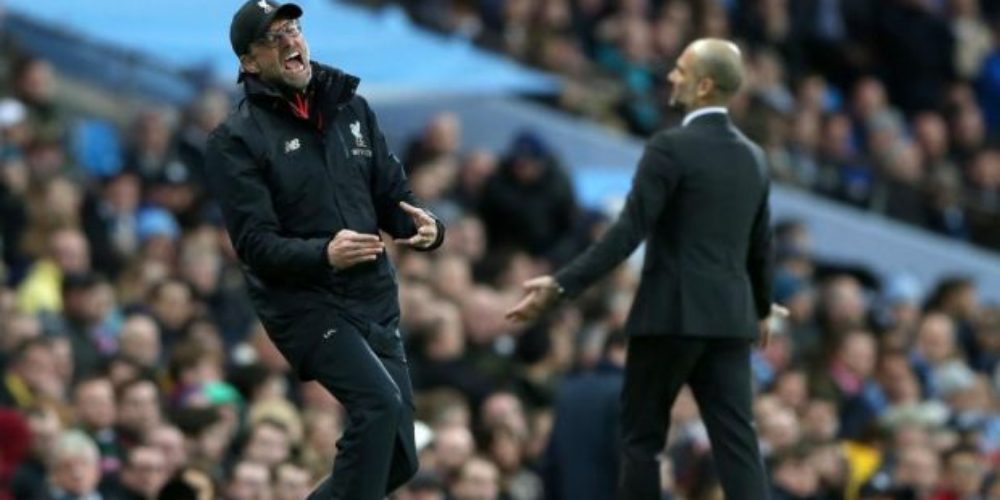Hail the monomaniacs!

Photo credit: EPA
Pep Guardiola lifted the English Premier League trophy last Sunday on behalf of the club he manages, Manchester City. I think we should all applaud, regardless of team affiliation.
For me, the most interesting part of Pep’s season came during a game in November. He began berating a player who just been substituted in extremely animated fashion, shouting in his face and giving him what looked like a severe ticking off. No real surprise there, you might think; Guardiola is a mercurial and passionate figure, full of high emotion.
But there is a surprise in there. Pep was not talking to his own player; he was remonstrating with winger Nathan Redmond, who had just been substituted by Manchester City’s opponents that day, Southampton FC.
Why on earth would he be tearing a strip off an opposing player? Here’s the final surprise: Pep was upset that Redmond, whom he holds in high regard, had played such a tame, defensive game. He wanted him to do better, to utilise all his talent, to not learn bad habits.
Nathan Redmond confirmed this later, saying Pep had “commented on my qualities as a young English player and how he wanted me to attack his team more during the game…nothing negative or offensive was said towards me from Pep and that’s what makes him one of the best managers in world football…yes he was very passionate, intense and aggressive but he was only very complimentary and positive to me. When one of the world’s best managers compliments you or gives advice in any way, you listen.”
Manchester City later went on to wrap up the title with many weeks to spare. They played an always-attacking, always-open style. It was swashbuckling and free-flowing football at its best. They were streets ahead of any current pretenders to that throne.
The hackles of rival fans are undoubtedly rising after reading that paragraph. Many will say the Pep phenomenon is a fake one, because he ‘buys’ his successes. There is no doubt that Manchester City has some of the world’s richest shareholders, and that its manager can buy pretty much any player he wants. But that is the nature of the top levels of the game now; the biggest rewards go to those who can spend big. To focus on the financial aspect is to miss the bigger point.
Pep was chastising an opponent’s player because he cannot stand seeing the game played cynically, particularly by those who should know better and can do better. He could not contain himself, because he is a monomaniac – a person obsessed about his one big thing in life. In my forthcoming book (The Bigger Deal) I discuss a range of such monomaniacs (Wangari Maathai and Steve Jobs are two others) and say this: allow them their madnesses. They are obsessives, yes – but it’s a feature, not a bug. The world is better because of these fanatics. As long as their fixations create value for others, we should applaud them.
The only person to undo Pep was another ‘crazy’ person: Jürgen Klopp of Liverpool FC. He beat Manchester City three times over the season – and took one sound beating himself at Pep’s hands. Both these managers resolutely refuse to ‘park the bus’ and play low-block, dour, defensive soccer. It seems to be against their DNA. They do this even when a free-flowing approach is not in their immediate best interests – because they just can’t stand being boring and negative. In the end, the madness works. Pep took the EPL title with ease; Jürgen is in the UEFA Champions League final. Neither compromised en route. They play it the way they play it.
The wider lesson is this: the world needs the ‘crazy’ ones. They don’t conform, they don’t play safe, they are not pragmatic, they don’t play by the rules. They dance to an inner rhythm others can’t hear. When the passion ignites, they can’t help themselves. They overdo it often, but are never afraid of looking foolish. They make mistakes, but never deviate from their essence. Their purpose is their purpose, win or lose. They are often fired, but they don’t care. They often quit, but only when the world jangles them, and then only to regroup and come back stronger. They are relentless, but they won’t play it your way if your way is anathema to them.
Society as a whole takes risks, learns new things and advances because we have these people in our midst.
(Sunday Nation, 13 May 2018)

Buy Sunny Bindra's new book
The X in CX
here »
Popular Posts
- The pause that saves usJune 8, 2025
- Where are you rushing to—your funeral?June 29, 2025
- How to spot a real thinkerJune 15, 2025
- The first push is the hardestJune 1, 2025
- Built the app, forgot the flowJune 22, 2025















